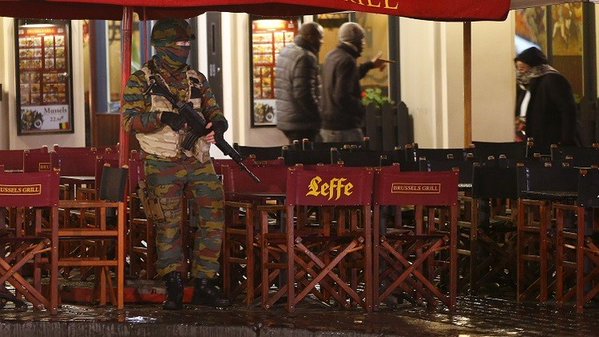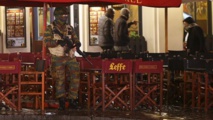Armed officers and troops could be seen patrolling the near-deserted streets of Brussels all weekend after the government raised the terror alert to the highest level of four in the city of more than a million that is also home to the NATO and European Union headquarters.
Premier Charles Michel said after a meeting of the national security council Sunday that the metro system would remain shut and schools and universities would be closed over concerns that jihadists were planning a repeat of the Paris gun and suicide bombing attacks that killed 130 on November 13.
"What we fear are similar attacks, with several individuals in several places," he told reporters.
"The threat is considered serious and imminent," he said, adding that the rest of the country would remain on security alert level three.
Officials will review the situation again on Monday.
The historic Grand Place in central Brussels, usually bustling, was virtually empty at the weekend, with business badly hit in the run-up to Christmas as anxious residents heeded warnings to stay home.
- 'Several suspects' -
The federal prosecutor was to hold a press conference around midnight (2300 GMT) to discuss the latest developments after officials said police operations in the Brussels area had ended.
A social media blackout requested by police -- so as not to give away officers' movements -- was lifted once the operations were over.
Interior Minister Jan Jambon earlier said the authorities were looking for "several suspects" and not just for Abdeslam, who is thought to have slipped past French security forces after taking part in the Paris attacks, which were claimed by the Islamic State (IS) group.
French police meanwhile released a photo of the third of three men who blew themselves up outside France's national stadium during the rampage, which also targeted the Bataclan concert hall as well as a string of bars and restaurants.
The man in the picture passed through Greece with one of the other suicide bombers, carrying a Syrian passport in the name of Mohammad al-Mahmod, a source close to the investigation said.
- Diplomatic offensive -
With the world on edge over the jihadist threat and momentum growing for a coordinated response, French President Francois Hollande will embark on a diplomatic offensive in coming days in a bid to forge a broad anti-IS coalition.
He will host Britain's David Cameron on Monday before holding talks with Obama, Germany's Angela Merkel and Russia's Vladimir Putin later in the week.
The UN Security Council on Friday authorised "all necessary measures" to fight jihadist violence after a recent wave of attacks, including the downing of a Russian aircraft in Egypt with the loss of 224 lives.
Both Moscow and Paris have stepped up their air strikes against IS targets in Syria in response to the attacks.
- Hollande 'shocked but focused' -
German Foreign Minister Frank-Walter Steinmeier, who was at the stadium along with Hollande attending a France-Germany football friendly when the bombers blew themselves up outside, told the daily Bild he had thought the first blast was fireworks, but soon realised it was a terror attack.
Hollande "was shocked, but at the same time very focused and determined," he added.
The French leader was evacuated, but Steinmeier and his team were asked to stay in the hope of avoiding panic among the some 80,000 fans, he said.
Meanwhile, Eagles of Death Metal, the Californian band that was playing at the Bataclan where 89 people were massacred, spoke for the first time since the attacks, with singer Jesse Hughes saying that many fans died tyring to protect their friends.
"So many people put themselves in front of people," he said in an excerpt of an interview with Vice.com.
- The Belgian connection -
The suspected ringleader of the November 13 attacks, Abdelhamid Abaaoud, died in a massive police raid in Paris on Wednesday.
He was a notorious Belgian jihadist thought to be fighting in Syria, and his presence in Europe has raised troubling questions about a Europe-wide breakdown in intelligence and border security.
Questions remain too over the role played by Belgian-born Abdeslam -- who used to run a bar with his brother Brahim in Brussels.
Brahim blew himself up outside a Paris bar on November 13.
A third brother, Mohamed Abdeslam, told Belgian TV he believed Salah had at the last moment decided not to go through with the attack.
He said the family wanted him to give himself up.
"That way he can give us the answers we seek, our family and the families of the victims," he said.
------------------------------------------------------------------------------------------------------------
Premier Charles Michel said after a meeting of the national security council Sunday that the metro system would remain shut and schools and universities would be closed over concerns that jihadists were planning a repeat of the Paris gun and suicide bombing attacks that killed 130 on November 13.
"What we fear are similar attacks, with several individuals in several places," he told reporters.
"The threat is considered serious and imminent," he said, adding that the rest of the country would remain on security alert level three.
Officials will review the situation again on Monday.
The historic Grand Place in central Brussels, usually bustling, was virtually empty at the weekend, with business badly hit in the run-up to Christmas as anxious residents heeded warnings to stay home.
- 'Several suspects' -
The federal prosecutor was to hold a press conference around midnight (2300 GMT) to discuss the latest developments after officials said police operations in the Brussels area had ended.
A social media blackout requested by police -- so as not to give away officers' movements -- was lifted once the operations were over.
Interior Minister Jan Jambon earlier said the authorities were looking for "several suspects" and not just for Abdeslam, who is thought to have slipped past French security forces after taking part in the Paris attacks, which were claimed by the Islamic State (IS) group.
French police meanwhile released a photo of the third of three men who blew themselves up outside France's national stadium during the rampage, which also targeted the Bataclan concert hall as well as a string of bars and restaurants.
The man in the picture passed through Greece with one of the other suicide bombers, carrying a Syrian passport in the name of Mohammad al-Mahmod, a source close to the investigation said.
- Diplomatic offensive -
With the world on edge over the jihadist threat and momentum growing for a coordinated response, French President Francois Hollande will embark on a diplomatic offensive in coming days in a bid to forge a broad anti-IS coalition.
He will host Britain's David Cameron on Monday before holding talks with Obama, Germany's Angela Merkel and Russia's Vladimir Putin later in the week.
The UN Security Council on Friday authorised "all necessary measures" to fight jihadist violence after a recent wave of attacks, including the downing of a Russian aircraft in Egypt with the loss of 224 lives.
Both Moscow and Paris have stepped up their air strikes against IS targets in Syria in response to the attacks.
- Hollande 'shocked but focused' -
German Foreign Minister Frank-Walter Steinmeier, who was at the stadium along with Hollande attending a France-Germany football friendly when the bombers blew themselves up outside, told the daily Bild he had thought the first blast was fireworks, but soon realised it was a terror attack.
Hollande "was shocked, but at the same time very focused and determined," he added.
The French leader was evacuated, but Steinmeier and his team were asked to stay in the hope of avoiding panic among the some 80,000 fans, he said.
Meanwhile, Eagles of Death Metal, the Californian band that was playing at the Bataclan where 89 people were massacred, spoke for the first time since the attacks, with singer Jesse Hughes saying that many fans died tyring to protect their friends.
"So many people put themselves in front of people," he said in an excerpt of an interview with Vice.com.
- The Belgian connection -
The suspected ringleader of the November 13 attacks, Abdelhamid Abaaoud, died in a massive police raid in Paris on Wednesday.
He was a notorious Belgian jihadist thought to be fighting in Syria, and his presence in Europe has raised troubling questions about a Europe-wide breakdown in intelligence and border security.
Questions remain too over the role played by Belgian-born Abdeslam -- who used to run a bar with his brother Brahim in Brussels.
Brahim blew himself up outside a Paris bar on November 13.
A third brother, Mohamed Abdeslam, told Belgian TV he believed Salah had at the last moment decided not to go through with the attack.
He said the family wanted him to give himself up.
"That way he can give us the answers we seek, our family and the families of the victims," he said.
------------------------------------------------------------------------------------------------------------









 Home
Home Politics
Politics











